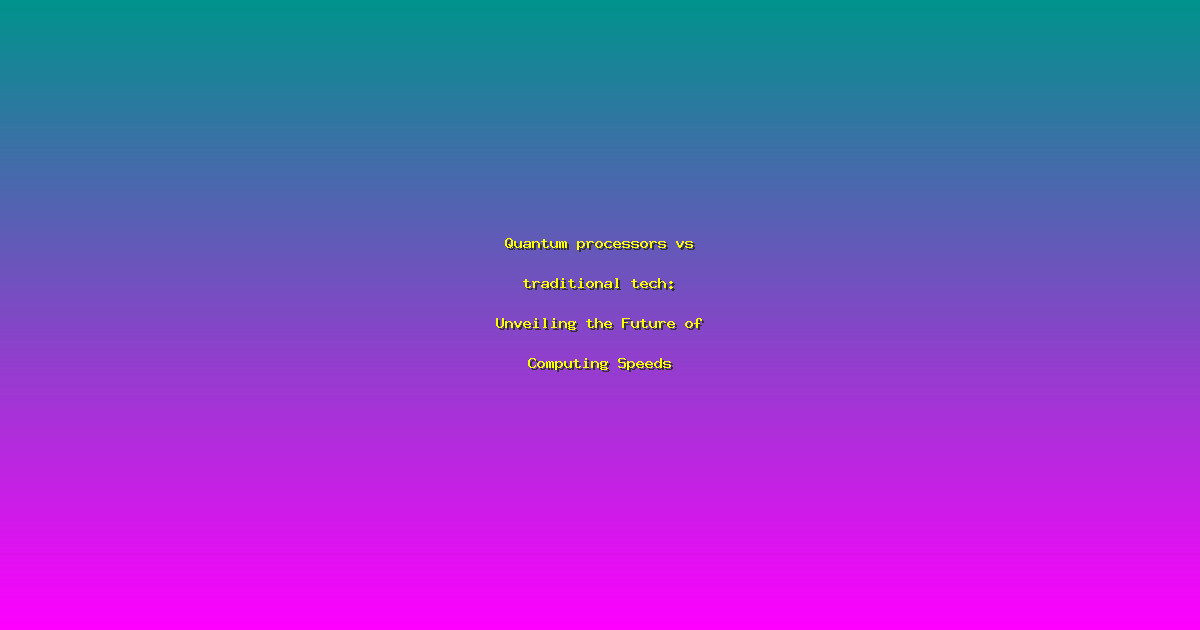Quantum Processors vs Traditional Tech: Unveiling the Future of Computing Speeds
As technology continues to evolve, the race to the next computing horizon involves quantum processors. These revolutionary processors promise to redefine the boundaries of computational power, setting them apart from traditional computing technologies. This article delves into the differences between quantum processors and traditional tech, providing a glimpse into the future of computing speeds.
Understanding Traditional Computing
Traditional computing, based on the principles of classical physics, relies on bits as the basic unit of information. Each bit in a traditional computer can exist in two states: 0 or 1. This binary system forms the foundation of all computational operations in conventional computers, from personal laptops to powerful servers. However, the limitations of this binary system are becoming increasingly apparent as computational tasks grow more complex and data-intensive.
The Promise of Quantum Computing
Quantum computing introduces a paradigm shift with qubits, which can exist in multiple states simultaneously due to the principles of superposition and entanglement. Unlike traditional bits, qubits can hold more information and process it more efficiently, potentially leading to groundbreaking improvements in speed and efficiency. This quantum advantage could revolutionize fields such as cryptography, drug discovery, and artificial intelligence, among others.
Comparing Quantum and Traditional Processors
The key difference lies in how information is processed. Traditional processors are sequential and deterministic, following a set of instructions in a linear fashion. Quantum processors, on the other hand, take advantage of quantum properties to perform multiple calculations at once, potentially solving problems much faster than classical processors.
Challenges and Future Prospects
While quantum computing holds immense potential, it also faces significant challenges, including high error rates, the need for extremely low temperatures, and the difficulty of scaling up quantum systems. Despite these obstacles, research and development in this field are advancing rapidly, suggesting that quantum computers may soon become a practical reality, potentially reshaping industries and solving problems that are currently intractable with traditional technology.
FAQs
- Q: What are the main differences between quantum and traditional processors? A: Traditional processors use bits to process information in a linear fashion, while quantum processors use qubits to process multiple states simultaneously, leveraging quantum mechanics.
- Q: Can quantum processors perform any task that traditional processors cannot? A: Quantum processors are particularly adept at handling complex problems like cryptography and optimization, which can be extremely time-consuming or nearly impossible with traditional processors.
- Q: What are the current limitations of quantum computing? A: Quantum computers are currently limited by high error rates, the need for extreme cooling, and the complexity of scaling up these systems.
- Q: When will quantum processors replace traditional processors? A: It's uncertain when quantum processors will replace traditional ones, as both technologies are likely to coexist, with quantum processors being used for specialized applications.
- Q: How do quantum computers work? A: Quantum computers use qubits and principles of quantum mechanics like superposition and entanglement to perform computations, which can be exponentially faster for certain tasks.
Conclusion and Call to Action
The world of computing is on the brink of a quantum leap, with quantum processors poised to redefine computational capabilities. As this technology matures, it will undoubtedly lead to groundbreaking advancements. Stay updated with the latest developments in quantum computing and traditional tech to be part of this exciting journey into the future of computing.

